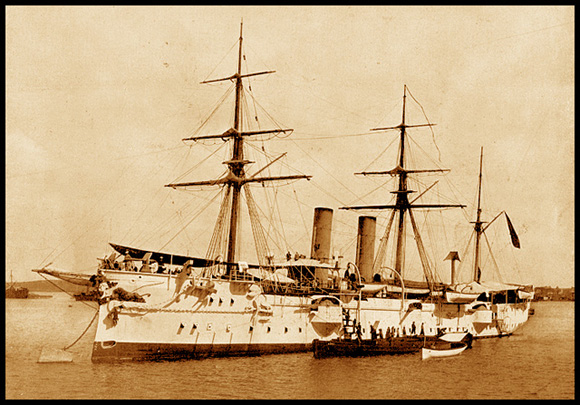


By 1897, she was in Havana harbor. She was not in a seaworthy condition. Her boilers required a major overhaul, and some of her guns were removed to be used in the harbor fortifications.
When the battleship MAINE arrived in Havana harbor in January 1898, her captain, Charles Sigsbee asked the harbor pilot for the ALFONSO XII's berth, believing that this berth must be free of mines. The pilot had to inform Sigsbee that this was not possible, since the Spanish vessel was incapacitated. The MAINE was moored two hundred yards away from the ALFONSO XII. The MAINE fired a salute to the pennant of Admiral Vincente Manterola which flew from the halyards of the Spanish vessel. The ALFONSO XII was commanded by Manuel Eliza.
When explosion destroyed the MAINE, the ALFONSO XII crew immediately went to the aid of their brother sailors, rescuing many from the waters and taking them back to the Spanish vessel to be treated in its sick bay. In the following days, crewmen from the Spanish vessel helped stand gaurd over the sunken hulk, warding off souvenir hunters, and, unfortunately, some of the MAINE officers who were not recognized in their civilian clothes. Later, the crew of the ALFONSO XII took part in the funeral services for the MAINE crewmen in Havana, marching in the funeral cortege.
As war approached, ALFONSO XII was partially disarmed. Three of her 160-mm guns was mounted on Chorrerabattery, and other three was mounted at Regina battery. Therefore ALFONSO XII's guns did fire on the American navy. On May 10, the Chorrera battery fired on the US auxiliary cruiser TRITON. On July 19 guns of the ALFONSO XII fired on the USS MAYFLOWER.
The vessel remained in Havana throughout the war. She was returned
to Spain after the war and placed out of commission in 1900.
| Classification: | First Class Cruiser (Unprotected) | |
|---|---|---|
| Launched: | August 21, 1887 | |
| Commissioned: | 1891 | |
| Rig: | Three masts | |
| Armament: | Six 16 centimeter Hontoria guns | |
| Three 57 millimeter Nordenfelt guns | ||
| Two 42 millimeter Nordenfelt guns | ||
| Six 37 mm Hotchkiss Revolving Cannons | ||
| Three Gatling Guns | ||
| Five torpedo tubes | ||
| Contractor: | Spanish Naval Shipyard at Ferrol | |
| Length: | 84 meters | |
| Beam: | 13 meters | |
| Draft: | 6.7 meters | |
| Displacement | 3,900 tons | |
| Compliment: | 380 Men under the command of Manuel Eliza | |
| Engine Type: | Single screw, 4,100 hp. | |
| Speed: | 15 knots (design) 12.5 (actual) | |
| Sail Surface |
1725 sq. meters
|
|
| Coal bunker capacity: | 720 tons | |
| Range | 4,000 nautical miles | |
| Armor: | Unarmored, 3/8 inch steel on slopes and flats. | |
| Cost: | Cost: $490,000 (for hull and machinery). |
Valdivieso, Mario, Ferrol Shipyards (personal correspondence).

